Future Scope Celebrates 20th Anniversary with 3-Day Zagreb Music Festival
February 6, 2022 - From May 13 to 15, Zagreb's Jarun will host the first Future Scope festival on four stages, with over 30 performers from the electronic, hip hop, rock, and pop music scene.
Last year, one of Zagreb's most famous club programs, Future Scope, marked its 20th anniversary. This year it is celebrating in style - with a three-day festival on Lake Jarun, which will take place on four different but quality stages. This birthday is celebrated from May 13 to 15, 2022, and the protagonists of the celebration are some of the most famous local and international musicians.
The impressive line-up is led by one of the most famous techno DJs Sven Väth, nicknamed Papa Sven due to his exceptional contribution to the genre.
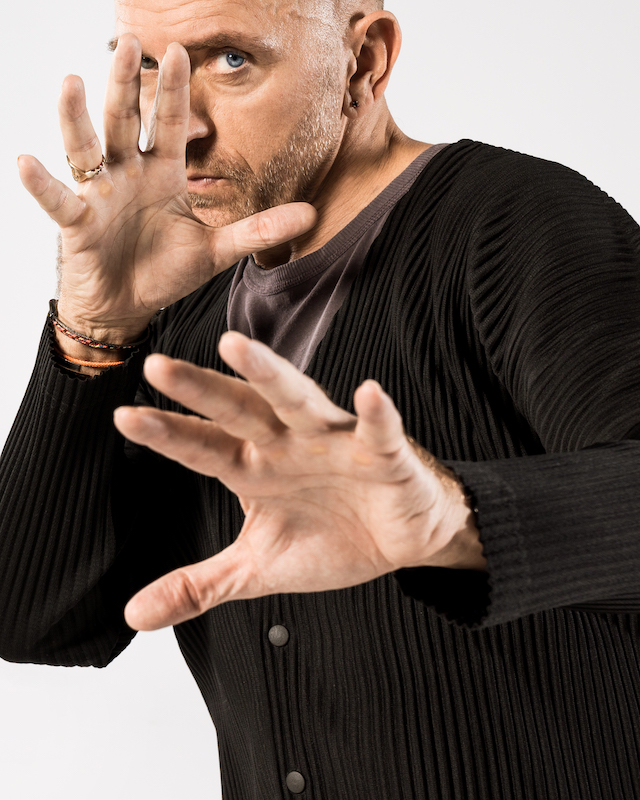
He is followed by Stacey Pullen (who comes to Zagreb from Detroit, the city where techno originated), trance veterans Mauro Picotto and Paul Van Dyk, Sam Paganini, responsible for the timeless anthem "Rave," Rush, an American DJ and producer who boasts dozens of records and releases, Nicole Moudaber, one of the most successful women in electronic music, and Faithless, the electronic band that released "Insomnia" is coming to Zagreb to play a DJ set. Fans of the British Wiggle tech-house sound are thrilled because Terry Francis and Nathan Coles, very well known to the Zagreb audience, are on the line-up, and the program will be complemented on all days by well-known names of the Croatian electronic scene, including Future Scope residents; Petar Dundov, Felver, Shipe, DJ Jock, Mr. DJ Dario, Marina Karamarko, E-base, and others.
Rundek and Ekipa, TBF, Elemental, Detour, ABOP, Boris Štok, and many other names will perform on the Live Stage, announced by the festival organizers soon!

The Future Scope team is preparing a serious festival that can compete alongside the world's best festivals, such as the regional Exit. For 20 years, they have organized over 700 parties and concerts and didn't stop even during the pandemic.
"We look at music as a broad term, which is why we decided to create a festival that combines different genres and even different audiences. As a result, this will be an interesting blend of subcultural and mainstream musical directions. But, although the two directions in which we are going are stylistically different, they have some things in common - urban flair, quality, and an audience eager for good fun," said the organizers.
Although the first Future Scope party was technically held in April 2001, the team behind the brand points out that in 2002 they started with big foreign tours, which have remained their trademark and strongest asset, so they consider that the year the brand was born. In those 20 years, they explored numerous locations, from Murter's Čigrađa to The Best and the former OTV, for the program to find its permanent home in Boogaloo and Jarun.
They are most proud of their audience.
"They kept us on guard, and because of them, we always invested maximum effort and patience. Without them, we would not be so consistent and ultimately long-lived. If we have to single out projects that keep a special place in our hearts, they are Fatboy Slim at the 2020 Fair and Boris Brejcha at Jarun in the same year. These were two large parties that we managed to do despite the complicated COVID-19 measures. We also remember Amelie Lens at the Fair with 3,000 visitors and the party with Jeff Mills in Boogaloo, which is the most visited event in the history of that club," concluded the organizers.
The organizers have prepared early bird festival tickets that can be purchased until February 15 at a promotional price of 199 kn through on Entrio. More information about the festival can be found on their social networks.
For more, check out our lifestyle section.
Meet Vukovar 365, Full of Life: Saša Salamon of Code Consulting
February 6, 2022 – Meet Saša Salamon, the founder of Code Consulting, a software development company that found its home on the banks of the Danube. Not only have they been successful in establishing an excellent brand, but the team is also constantly growing, and Saša is inviting all potential candidates to step forward and become part of his amazing team.
If you've been following the Vukovar 365 series, you've met some of its creative souls, sports enthusiasts, entrepreneurs, overall impressive, engaging, and positive examples of the human species. Lucky we are to have them. Hopefully, the series broadened your views and understandings and made you look at Vukovar as a breathing city, indeed full of life and ready to face the future. And no image of the future would be complete without the IT guys powering it all. Time to learn about the IT scene in Vukovar and the fantastic team (Corgi included) behind it all.
Code Consulting is a reasonably young but reputable software development company whose home is no less than this humble town on the Danube. It was brought to life by Saša Salamon, who left a full-time permanent job (the dream of many Croatians) to start his own business in 2013. Since then, Code Consulting grew and established its position mainly within the medical industry. Saša spoke about the beginnings, the now, the future. He finds Vukovar to be the perfect place to live and grow. Asked about the Vukovar Card idea, he does say that the schedule is packed full and that our guests might need a break. One could argue that this only shows how much there is to offer. It also highlights one of the more important points of the true Slavonian (and Croatian) lifestyle – take it easy. Focus on the real values in life and appreciate those around you, at least as much as Saša appreciates his team.
Tell us about Code Consulting - what do you do?
CodeCons is a team of about 60 web and mobile application development professionals. We mainly deal with solutions in the medical industry for clients in the US. Our team consists of experts in different areas of software development, from architecture, design, development, testing, infrastructure... thus we can cover the entire course of software development, from the initial idea to production. We work mainly on long-term projects that last for several years and constantly evolve.
How did it all start?
It started a long time ago, about 10 years. I had a permanent job in a large company, but I would spend my free time programming, mostly freelance, with various clients from all over the world. My clients were quite happy with my work and wanted to continue our collaboration, so I decided to start doing it full-time at one point. As the business expanded, I kept looking for and hiring more people, so it all kept unfolding.
What was it like to start such a business in Vukovar? What were the main challenges?
IT is a location-independent industry. Whether it's Vukovar, Zagreb, Varaždin... it doesn't matter where you are. The team is important; you need to make up a good team of people who love their job and are experts in what they do.
The biggest challenge has always been finding good people, enough good people to get the job done. So we are constantly hiring; in fact, I would like to use this opportunity to invite anyone interested to contact us, check us out and see if you like what we do here.
As far as location goes, it wasn't about that at all for us. Our team is crucial for our success.
Are you happy with how your business is developing? What is your perspective for the future?
I am happy. We have an excellent team, regular clients satisfied with our product, and we are working on some new technologies. So far, we have been doing well, and I hope the trend continues.
What opportunities are there in our city and our region?
Vukovar is a small town, and we need to keep that in mind. The pros of living here include no crowds, everyone knows everyone, and we are a very safe city. There are also some cons, primarily that we lack some facilities, but Osijek is 30 minutes away, which is not that far. When it comes to work, like anywhere, it heavily depends on what people do.
What is your view on other small businesses in the area?
We are trying to connect with other IT companies in the region. In 2019 we founded the association VVIT to connect and get to know IT companies in the region and promote our IT sector. Our region is not just about agriculture; we want to show a strong IT community here to get more people and companies to come in this direction.
If we were to implement Vukovar Card, would you support the initiative, and what would you add to this idea?
I believe that tourism is a neglected economic branch in our region and any initiative to raise it to a higher level is welcome. However, I don't know whether this is the right way to do it. I don't know. We need good ways to attract people to come and see experience Slavonia, but this requires a joint effort of the state and private companies in tourism or related to tourism. The situation is getting better year by year, but very little has been done so far.
I read about this initiative and the proposed itinerary, and my suggestion would be to tone it down a little. Seven days at such a pace might be too much, and people would not get the real experience of Slavonia and Baranja, living a slow pace in which everything is still achieved. I am afraid that by day 3, our guests would become tired and would have had enough of it. Also, why not include family farms and private accommodation facilities, which are plentiful and offer much more than hotels in terms of experience and comfort.
Finally, tell us about life in Vukovar. What do you like most? What would you say to all potential visitors?
When you say Vukovar, the first thing I think of is the Danube. It is the second-largest river in Europe and the city that literally lies on its banks. The Danube provides sailing, fishing, swimming, exploring nature from land or water. Rare are the cities that lie on such large and mighty rivers.
I love living in a small town; I think it gives me everything I need at the moment. I always tell people to come and see, try, experience it. Give yourself a time plan in a relaxed way. Oh, and we are not that far from Zagreb... they say that Zagreb is about the same distance from us!
Where can we find you?
Check out our website as well as our Facebook page.
For more, check out our lifestyle section.
How Much Will Covid Tests for Croatian Schoolchildren Cost?
February the 6th, 2022 - Croatian schoolchildren will not need to begin having tests at home before arriving at their school premises for another week. It seems that the pricing information has also come in, which has been eagerly awaited by parents.
As Poslovni Dnevnik writes, the Directorate for Commodity Stocks has decided to purchase a massive three million rapid antigen tests for the at home testing of Croatian schoolchildren at a price of 6.95 kuna + VAT, as reported by Media servis.
On top of the pricing for the tests intended for Croatian schoolchildren, all of the necessary delivery dynamics have also been agreed and the first tranche of one million rapid antigen tests will be delivered by the 9th of this month at the very latest, and the rest within a period no longer than fourteen days.
Minister of Science and Education Radovan Fuchs said on Thursday that the at home testing of Croatian schoolchildren will begin when the Directorate of Commodity Stocks actually physically delivers the tests to the country's schools, and will be conducted in three phases, after which he hopes the need for them at all will disappear, writes tportal.
On Mondays, parents of Croatian schoolchildren will test their children for the presence of the novel coronavirus, and if a positive case occurs in the classroom, the test will be repeated and students who are negative can continue to go to school.
''We're going to be basing this on trust and assume that parents won't try to cheat the system to suit their liking, because the meaning of this measure is to keep as many children in their classrooms as possible,'' said Fuchs, adding that entire classes "dropped out" of their classrooms just because several students had tested positive.
Testing will be conducted for one month, and if everything goes as we imagined, we will move on to testing only in classes where a positive student appears.
The third step is the total abolition of such testing, Fuchs said, and expressed hope that the planned timetable could be realised, and that in the end it will be possible to abolish the wearing of masks as well.
For all you need to know about coronavirus specific to Croatia, make sure to bookmark our dedicated section and select your preferred language if it isn't English.
How Will Croatian Government Shield People from Rising Bill Prices?
February the 6th, 2022 - Just how does the Croatian Government plan to shield the average resident of this country from the ever-increasing prices for gas and electricity? There does appear to be somewhat of a plan in place.
As Poslovni Dnevnik writes, due to the current wave of exponentially rising prices, especially for energy, some EU member states have already adopted a package of measures to mitigate the price shock for residents. There is a lot of talk here in Croatia about inflation and prices, but the Croatian Government hasn't yet revealed the details of the aforementioned package of similar shielding measures.
However, it seems that it will be adopted earlier than it has been communicated so far, more specifically at some point during this month. At the same time, a solution to the gas crisis hasn't yet been found in Zagreb. Company owners are scratching their heads and don't know what to do with the huge bills they're getting, gas companies don't know what to do with their losses, and the city and the state are continually communicating in opposition as to who will pay the minuses and to what extent.
Prices in many shops have already risen several times and will continue to grow as this situation unfolds, but what's worrying many is the reports of a ''tsunami of price hikes'' which is set to arrive in April, when gas and electricity prices will rise even more. Everyone is waiting for the Croatian Government's package of measures with which, according to employers and the opposition, the powers that be are already running very late, as reported by N1.
"As for the thesis that it's late, no it isn't too late. There's nothing to be late for. We're working on a package of measures. This package of measures will affect all stakeholders in the system, in part companies. The idea is not to wait too long with this package, for it to be presented to the public and those interested during the month of February, in the coming weeks,'' said the Minister of Economy and Sustainable Development, Tomislav Coric.
Gas vouchers?
The poorest residents of this country who have already received electricity vouchers can now count on getting their hands on gas vouchers as well. It isn't yet known how many of them will have this particular possibility expanded to them and how many vouchers will be issued. As prices for both electricity and gas are sure to rise dramatically, the conclusion is clear:
"Two hundred kuna cannot be enough, but it's difficult to say at this moment in time how much the amount will have to go up. We ourselves tried to calculate whether it needs to be 300, 350, 400 or some other amount,'' said Kresimir Sever from the Independent Croatian Trade Unions.
A gas crisis in Zagreb
Meanwhile, a real gas crisis is happening here in the capital. When it comes to the city's gasworks, the supply is in such losses that bankruptcy is now a real threat, and the help of the state should not be counted on either.
"One should not expect from the Croatian Government, where the city government is in Zagreb, to cover the debt of the city gas supply in Zagreb," said Minister Coric.
However, Zagreb Mayor Tomislav Tomasevic claims that talks between the City and the Croatian Government are taking place. He admitted that part of the responsibility lies with the former administration headed by the late Milan Bandic, but there is also an objective circumstance - gas prices that are raging absolutely everywhere.
"There are also talks in various European Union countries between suppliers owned by local governments and the state, to absorb these blows, especially in the business sector, and also to enable the normal operation of these companies because there are many alternatives, all of which are bad for everyone,'' Tomasevic pointed out.
For more, check out our politics section.
When Will Croatian Loan Interest Rates Begin to Pick Up?
February the 6th, 2022 - When it comes to the question on many lips of precisely when Croatian loan interest rates might pick up again, the European Central Bank announced recently that its key interest rates are to remain at their existing minimum levels, despite record inflation which is currently occuring right across the Eurozone.
As Poslovni Dnevnik writes, that said, inflation, which was considered temporary by everyone last year, is obviously "spilling over" into this year as well, so much so that it exceeded five percent in the Eurozone back in January.
However, this decision of the ECB to not start with a significant tightening of their monetary policy was expected, given that the President of the ECB Christine Lagarde has stressed before that it should not be rushed, and that there will be no increasing of any key rates before the year 2023.
Some analysts are already questioning the ECB's assessment because it is obvious that inflation is unfolding much more rapidly than their previous forecasts claimed it would, and they think that the ECB itself also underestimates this very real risk.
With all of that having been said, even if there has been a change in perspective, one can hardly expect a sudden change in the narrative because even that recognition alone could be counterproductive. Recently it was indicated that key interest rates, and that includes those attached to Croatian loans, should not increase (it all depends on further inflation), but of course the door was left open for this to happen next year. However, the ECB remains on the path of reducing bond redemption above all else.
The ECB also said in a statement that the Governing Council would suspend the net purchase of assets under the Pandemic Emergency Purchase Programme (PEPP) at the end of March this year. As for the asset purchase programme (APP), it will be gradually reduced, and it is expected that “net purchases will be completed just before the key ECB interest rates start to rise”.
The ECB is therefore again at the back of central banks when it comes to changes in monetary policy. The US Federal Reserve announced a recent increase in key interest rates, on several occasions this year, and the Bank of England (BoE) also raised its key rate just a few days ago.
For more on taking out Croatian loans and how to go about it, check out our lifestyle section.
Istrian Town of Bale Offering Competitive Lures to Would-be Residents
February the 6th, 2022 - The Istrian town of Bale is picturesque and attracts many people to at least visit, and some to move, with its idyllic looks alone. On top of its fairy tale like pull, it now has some concrete lures to get people to make the move.
As Poslovni Dnevnik writes, in the blink of an eye, all of the one kuna plots in the gorgeous Istrian town of Bale were sold, Nova TV reporter Lina Dollar reported. She spoke with Bale Mayor Edi Pastrovicchi, who said there were no more vacant plots to be had.
"Some thirteen young families have contacted us, but we're preparing a new zone, so we will soon have some available once again and we will go with the tender again soon," announced Pastrovicchio.
Most of those who responded were people who are from the Istrian town of Bale, but as many as 30 percent arrived from outside of the town.
This Istrian town's mayor recalled that ten years ago they started a package of measures for demographic renewal. For example, families received ten thousand kuna for each newborn baby they had, nursery and kindergarten for all local children was made free, and from this year there will be a free snack for elementary school students, as well as free workbooks and extended stays. High school students also have all of their travel expenses co-financed.
As part of the Building Rights Project for young families, municipal plots in Bale for the construction of family houses are being allocated.
Last year, a crèche was built and the capacity of the kindergarten was expanded. The mayor says that in his eighteen years of being at the helm of Bale, the number of children has increased from 15 to 62, as many as are currently in kindergarten.
"These are certainly measures that help people stay here and move here, and I believe that this is a project that can be copied at the level of the whole country if there is money for it," concluded Edi Pastrovicchio.
For more, check out our lifestyle section.
‘Besides, the Food Is Very Good’: Impressions of Croatia in Travel Journals of Yore (II)
February 5, 2022 - In the second part of the feature exploring impressions of Croatia found in old travel journals, we're retracing the steps of several foreign visitors in Dalmatia.
If you haven't read the first part, please head here to meet our protagonists, fearless adventurers and diligent reviewers, and see what they thought of Istria. We’re picking up where we left off, with all of our esteemed travellers heading further south.
First up, Zadar, the main Venetian base on the Croatian coast back in the day and thus an obligatory stop on every tour of the Adriatic. Very well defined in this succinct statement by archaeologist Jacob Spon who travelled in Dalmatia in 1675:
It’s the capital and one of the best places that the Republic owns in Dalmatia.
He also liked the cathedral and excellent paintings of Titian and Palma displayed in the churches of Zadar, but I’ll spare you the rest of the paragraph as it’s not more than a list of artworks.
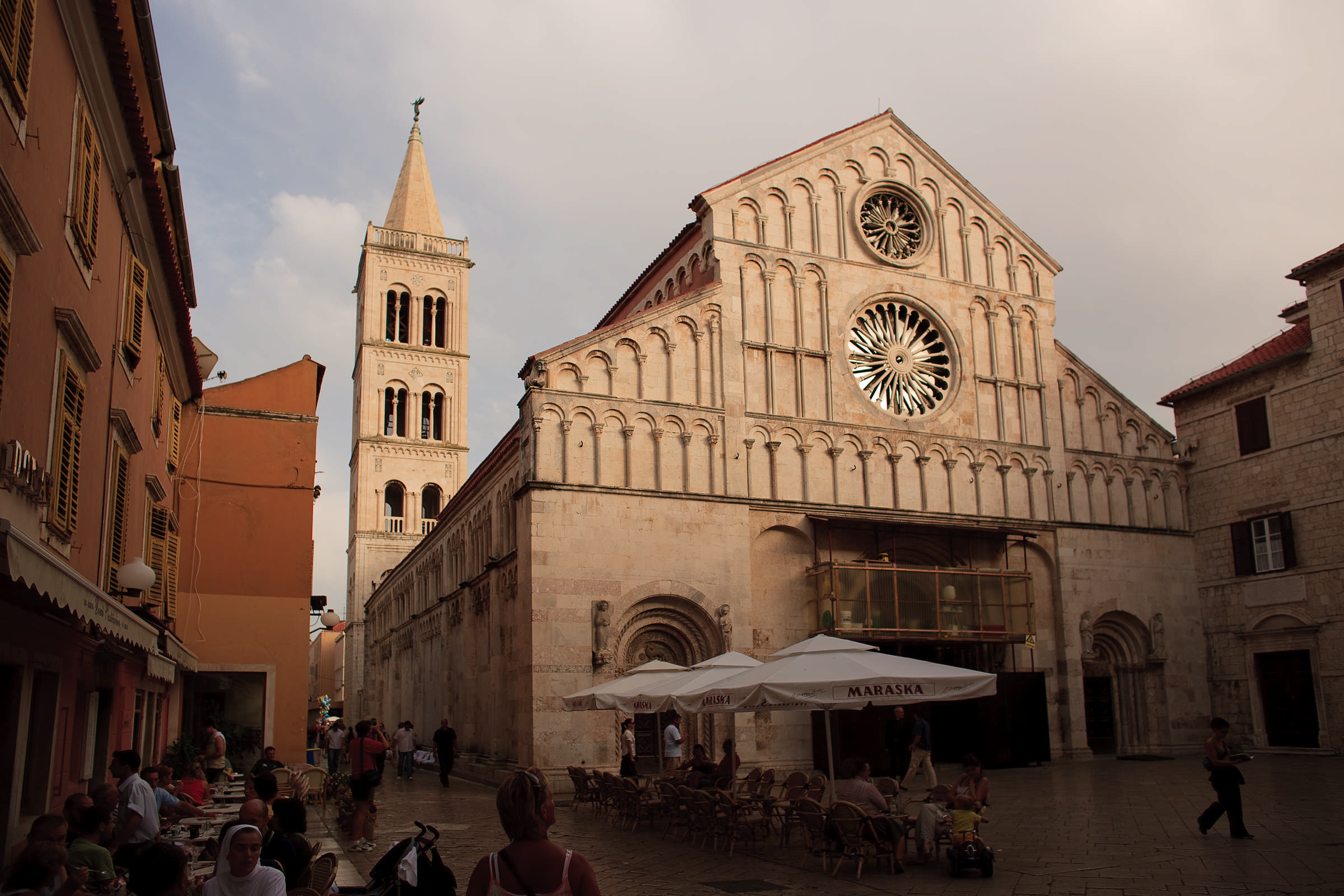 Zadar cathedral by Romulic
Zadar cathedral by Romulic
A few thoughts on Zadar by Noé Bianchi who visited in the 1770s, in his trademark enumeration style:
The city has six gates, a great Arsenal, and many ships and boats. It is a beautiful port, and a place to live in abundance; its territory spans over thirty miles on the mainland, with many castles, islands, and more than four hundred reefs. There are large pastures with plenty of livestock, and an abundance of all sorts of fish; they dress pompously, are very devoted to arms, but above all to humanist studies; they have many schoolmasters, and a lot of merchants.
Let’s hope it was the people of Zadar who dressed pompously and not the fish. Thankfully, we have a new character in our story: countess de La Morinière de La Rochecantin who offers her view of the locals, having visited Zadar in 1907:
The men are not handsome at all; their eyes are hard, their facial features sharp. The women, on the other hand, have a beautiful smile and something seductive under those colourful scarves with which they cover their heads.
Sorry, men of Zadar.
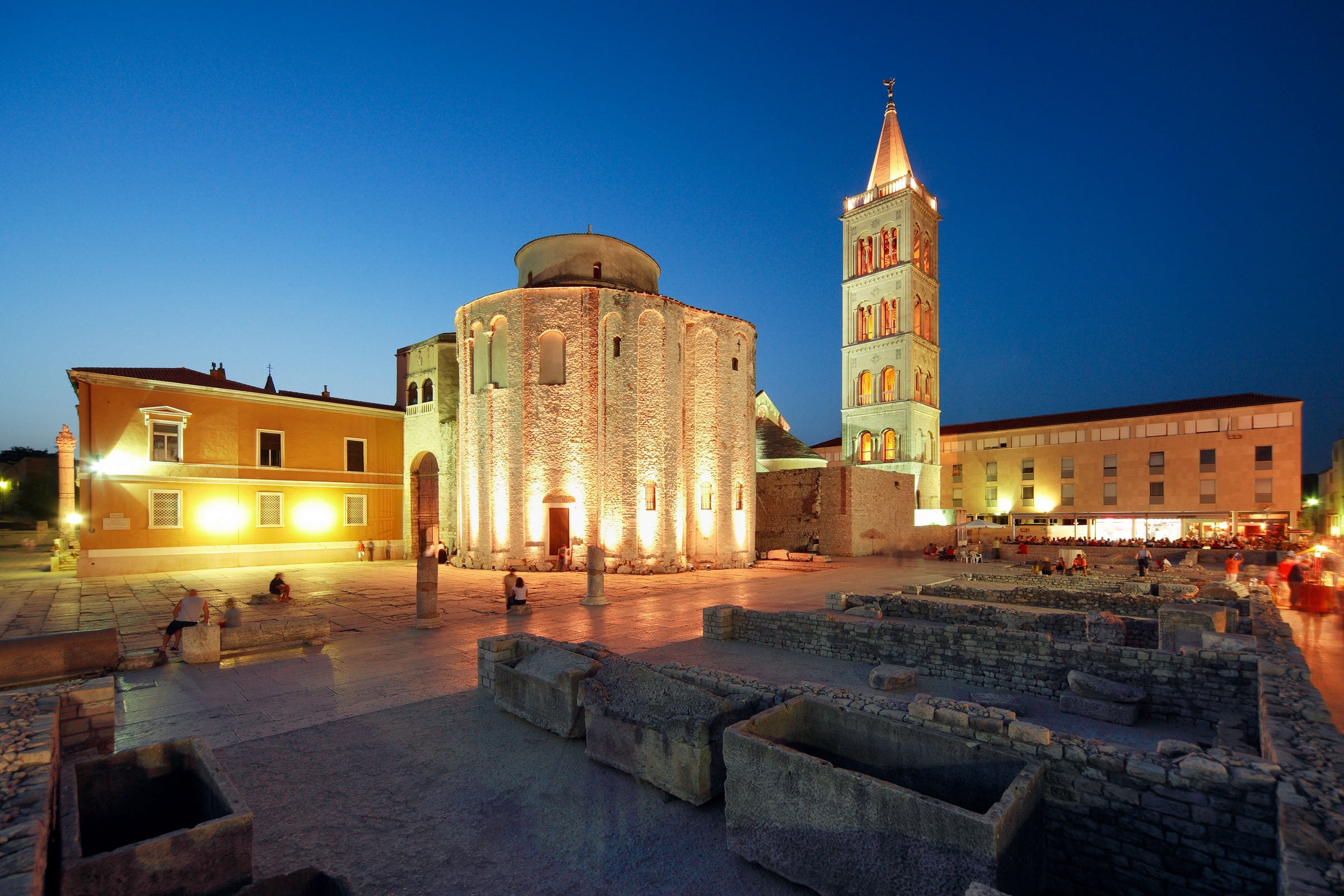 Zadar by Romulic
Zadar by Romulic
***
On we go to Trogir, where the countess notes the following:
The inhabitants are largely similar to those of the Illyrian islands, but this lot is more gentle. They live here in a small Provence. Tamarisk trees and pines, through which a soft wind whistles as if in song, line the narrow paths that run along the shore.
This morning, the water glistens with opal reflections, the air is gentle and warm, but it’s enough for the sky to get veiled in clouds for a feeling of melancholy to take hold of us. In these countries where the sun is king, it alone gives life to beings and things: aromatic plants, trees with pale foliage; the flora of such ardent regions only comes alive and reveals all its splendour and perfumes in the light and under the scorch of the sparkling star.
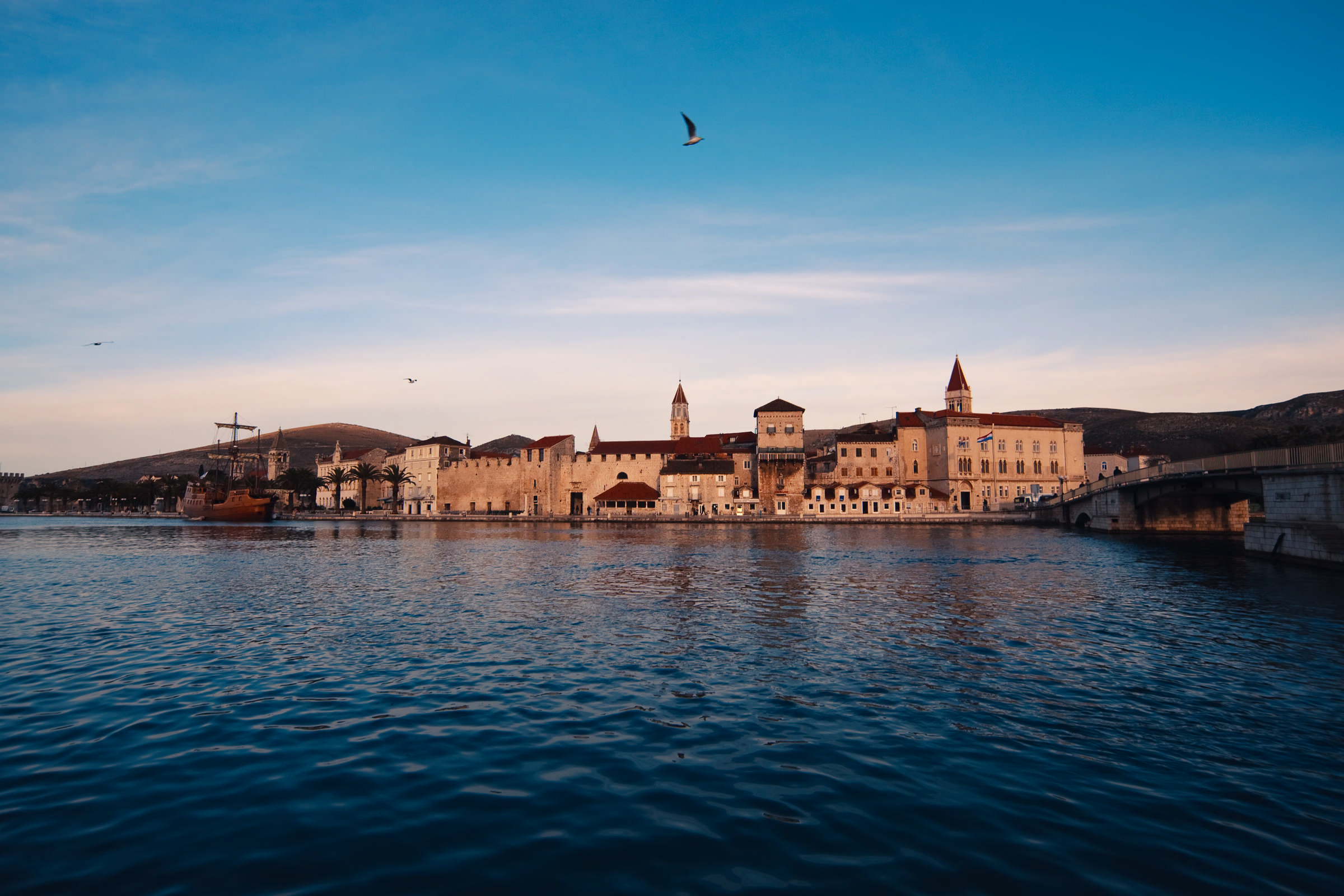 Trogir by Mario Romulic
Trogir by Mario Romulic
Spon on the other hand has a less poetic approach and seems to be excited about Trogir mostly due to it being the birthplace of Ivan Lučić Lucius, a Croatian historian of international renown.
Lucius is known as the father of Croatian historiography owing to his work 'On the Kingdom of Dalmatia and Croatia', in which he gives a comprehensive account of Dalmatia’s history from the Roman times to the end of the 15th century. Seemingly enough to merit admiration from monsieur Spon who, as we’ve learned, wasn’t easily impressed:
This monsieur Lucius is a nobleman from this country whom I had the honour to meet in Rome, where he is now residing. His homeland is indebted to him for having pulled it from the shadows of antiquity with the historic account he made.
 Trogir by Mario Romulic
Trogir by Mario Romulic
Immediately upon arrival, Spon and his party are struck by one of the worst troubles that can happen on a trip: no place to stay!
We had arrived in Trogir at dinner time and were looking for lodging, when we were told that we had to make our own arrangements for dinner, and that it wasn’t customary in that land to deal in hospitality [accommodation].
Naturally, as they were starving at that point, they weren’t exactly happy to hear this, but they got lucky shortly thereafter and found a place in town that sold wine. They were soon ushered into a nearby building that turned out to be none other than Lucius’s palace. This one:
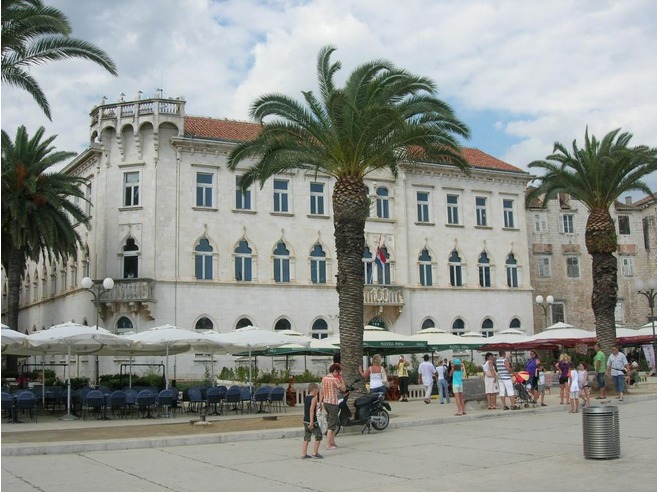
We were surprised to see this house, which is quite beautiful and has a view of the sea, empty and as if deserted, and we were even more surprised when we were told it was the house of this monsieur Lucius whom I just talked about. It has been more than twenty five years since he left it, all because of the incivility of a General of Dalmatia who, having arrived in Trogir, let [Lucius] know he wanted to lodge in his house. The nobleman was getting ready to receive him, and left for himself only a mediocre apartment. But the general immediately sent his people to take all the furniture outside. This impudence annoyed [Lucius] so much, he left the country immediately and never wanted to return.
Loving the gossip. Any thoughts on the sights, though?
The cathedral isn’t ugly. There are some statues in the church, made by a fairly good hand.
Today, the historic centre of Trogir, including the cathedral of St Lawrence, is a UNESCO World Heritage Site.
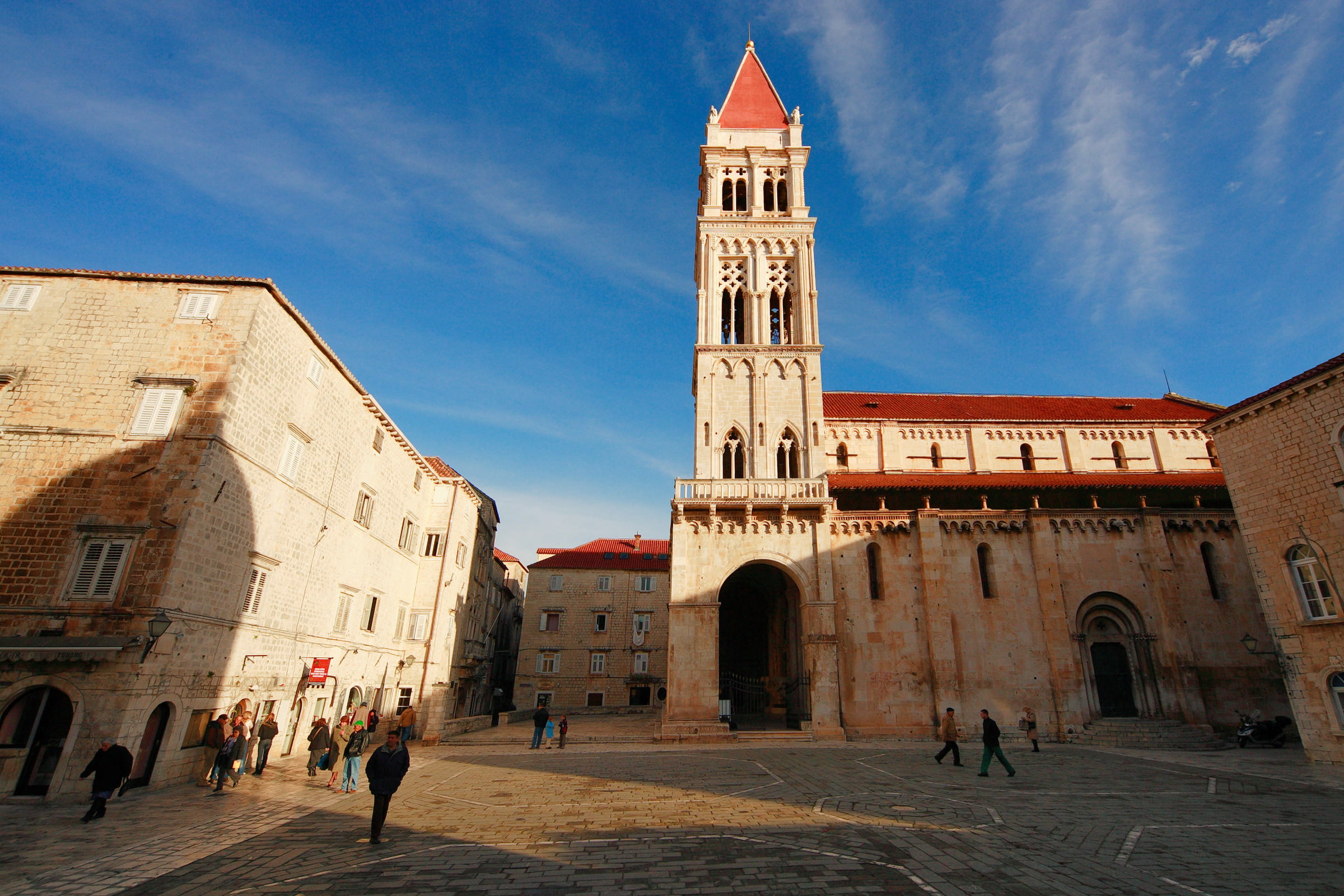 Trogir by Mario Romulic
Trogir by Mario Romulic
We have another appearance by Alberto Fortis who shares a warning: don’t get scammed on your travels! After two pages of musings on marble and its various properties, he says:
As I searched in vain around Trogir to find the famed marble, someone showed up who wanted to abuse my lack of guile by presenting me with a piece of Carrara marble as if it were taken from the nearby hill of St Elijah, where you can find old quarries whose marble isn’t rough at all, but is still far from the refined marble of Carrara.
No one's taking Fortis for a fool!
A traveller must always keep their guard up, as I have, before they draw conclusions based on other people’s claims. I.e., they should go directly to the site in question or at least threaten to do so in spite of all difficulties; that is how you uncover lies.
A marble-related crisis isn’t a situation a lot of us are likely to find ourselves in these days, but fine advice nonetheless.
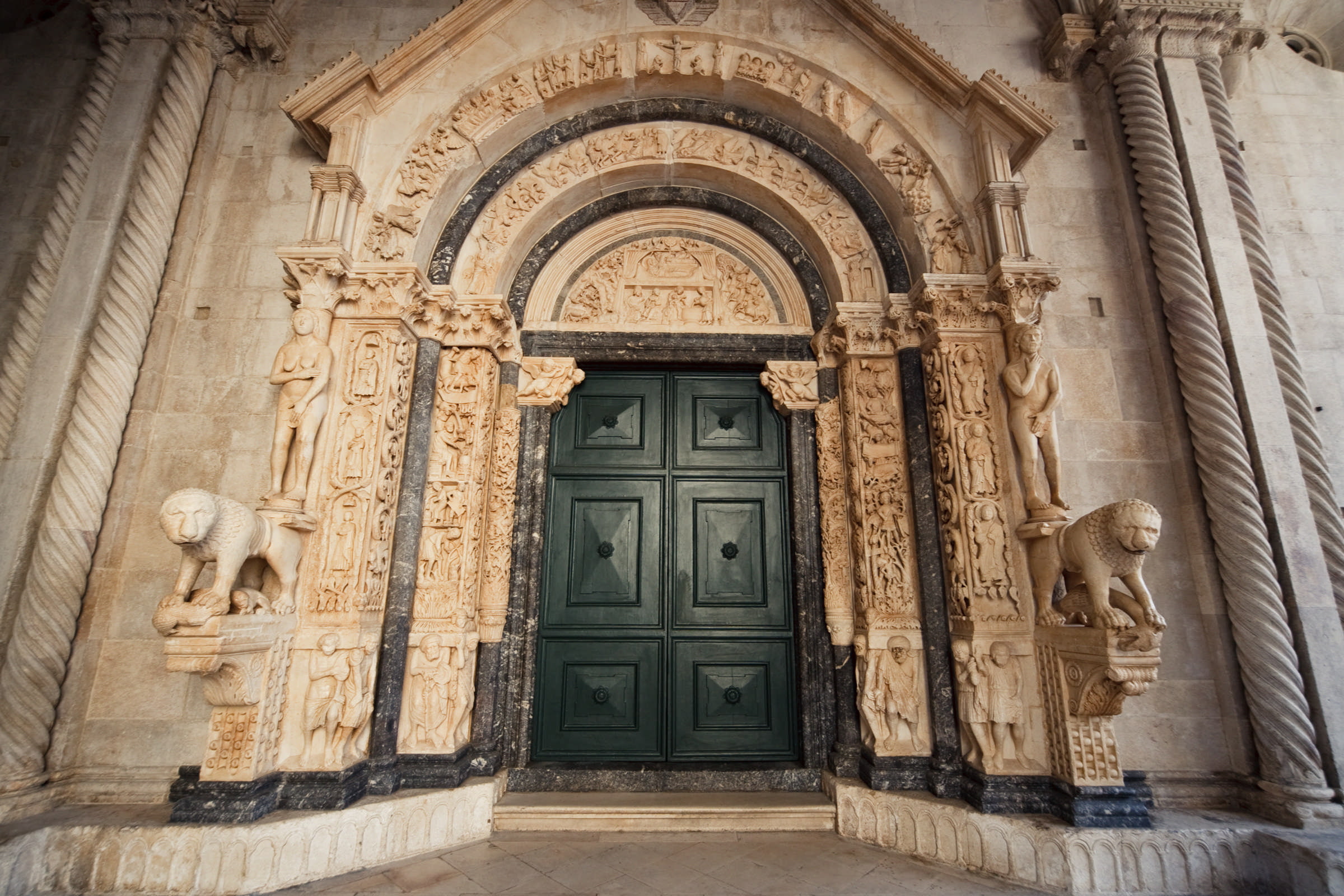 The portal of Trogir cathedral by Mario Romulic
The portal of Trogir cathedral by Mario Romulic
He adds a few favourable impressions of Čiovo island:
The island’s climate is truly very pleasant, the air perfect, oil, grapes and fruit excellent, the sea rich in fish, the port spacious and shielded. And its surface isn’t so small that a nobleman couldn’t comfortably walk or ride around it.
Good to know.
***
Before we go on to Split, a note on the hinterland by Marcotti, an Italian writer visiting in the late 1890s:
Those who want to be more in control of their time while travelling in the Dalmatian hinterland will prefer to travel by horse, but will have to get accustomed to a common lack of comfort in regards to accommodation and food: pecorino cheese, stale bread; plum brandy to drink. Corn polenta, ham, roasted lamb, smoked mutton and wine are items of luxury.
***
I believe we’re all familiar enough with the splendour of the Diocletian’s palace in Split to skip the lengthy elegies about its magnificence. Instead, let’s see a few impressions of the town in general, starting with Marcotti:
The market is especially crowded on Monday and Thursday mornings. It is interesting to see how peasants and people from the outskirts of town are dressed: bright colours (blue, red and black), large pieces of jewellery, filigree, gold and silver buttons, chains, medals. Compared with the Morlach women, the women of Kaštela stand out with their elegance.
The countess gets philosophical:
A rosy and curly child, with a serious expression of a grown man, leads us through narrow streets in the ruins of the palace. There is something moving about this loyalty that leads men to live where their ancestors lived, be it within the crumbling walls of an ancient palace or next to a dormant crater that will sooner or later sow devastation and death around it.
![]()
And Spon was surprisingly won over by Split, having spent ten days not doing much other than sampling the local cuisine:
The time we spent in Split did not last us long, because we discovered something new every day and besides, the food was very good. The only downside was accommodation which was not very convenient, as we found but four bare walls.
Partridge only costs five sols there, and hare doesn’t cost much more. There is meat at the butcher’s for one sol a pound, and turtles the size of two fists for four or five sols. But more often than not we preferred to abstain from meat and eat those little trouts from Salona, of which Emperor Diocletian was so fond, that for fear of running out of them he had an express conduit made which brought them to his palace.
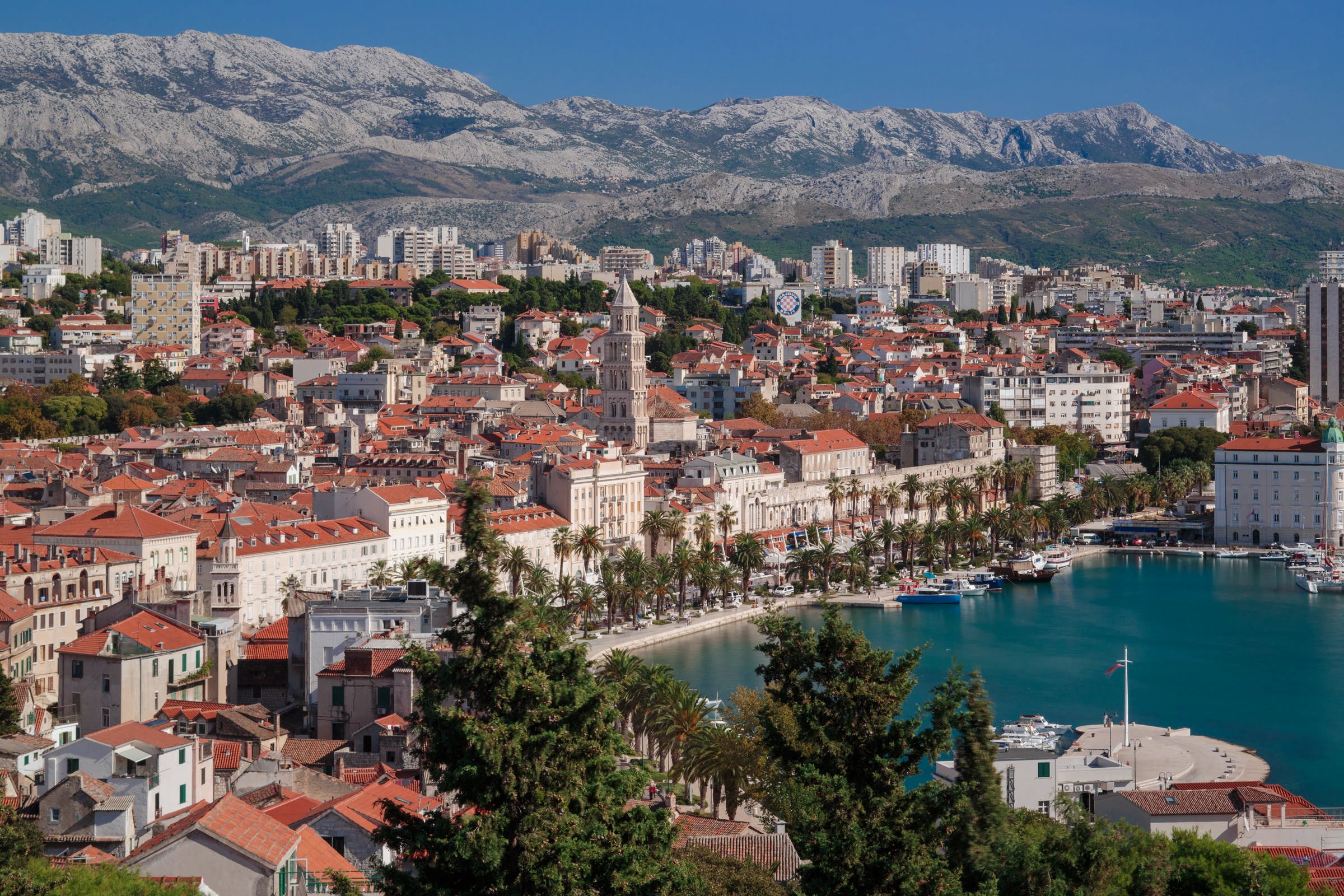 Split by Mario Romulic
Split by Mario Romulic
All of our brave travellers then went to see Klis. Marcotti offers some practical information:
From Split via Klis (2 hours) to Sinj (5 hours), superb road, but the postal service only operates twice a week. A permit from the commander’s office in Split is needed to visit the Klis fortress; it is not granted to ladies.
Rude.
It would take long to recall the whole of its glorious military history, he says about the fortress, then recalls it anyway. A history lesson later, he goes on to say:
The road, the gates, the barracks, they’re all modern; but the walls, the towers, the ramparts, all retain the picturesque charm of ancient military gear: the mosque was transformed into a warehouse. And there’s a beautiful view to boot. In the village, nestled on terraces below the fort, are several taverns.
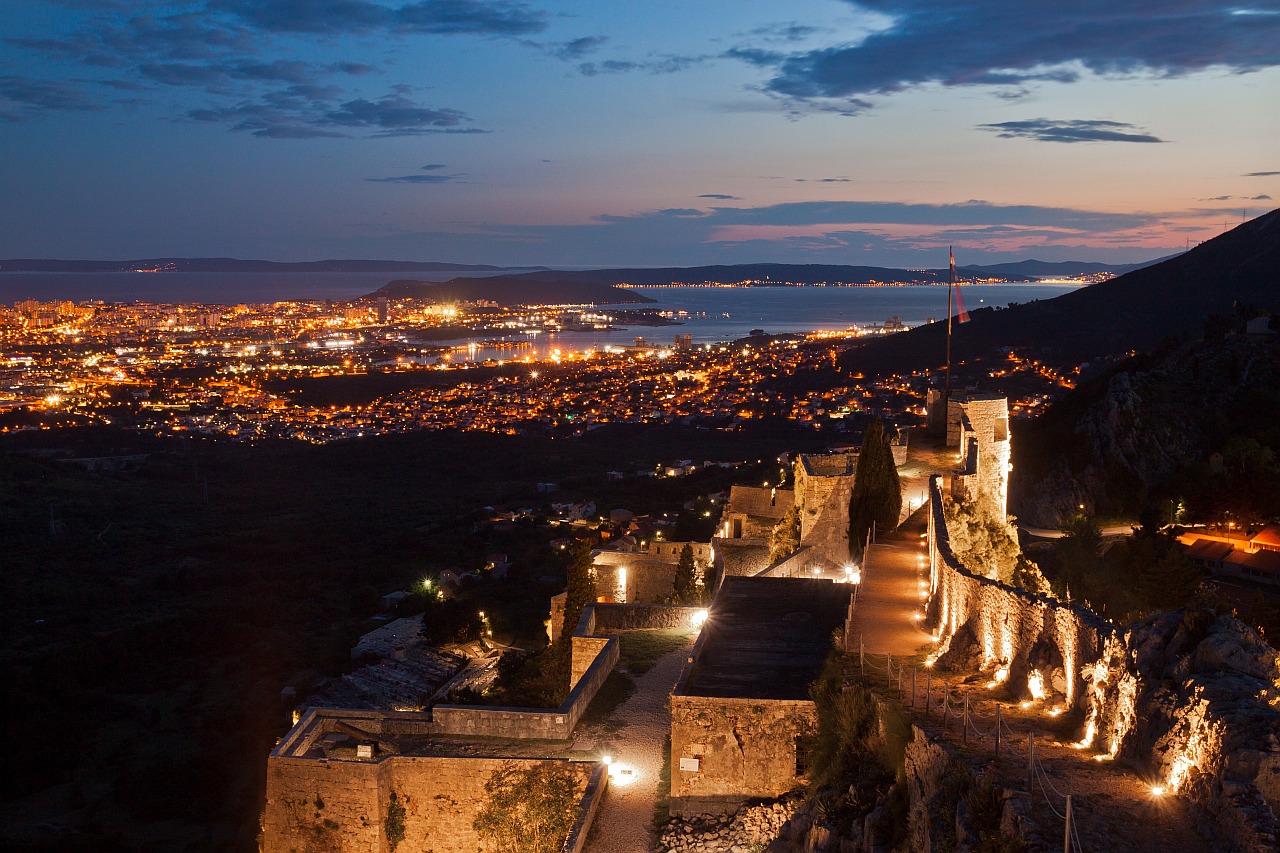 Kliss fortress
Kliss fortress
Countess Rochecantin:
The citadel of Klis, truly an eagle's nest which proudly dominates the valley. The rock it’s built on is surrounded by peaks which would seem inaccessible, if it wasn’t for little pockets of greenery bearing witness to the patient conquest of man over this rugged nature.
And then there’s Spon, bless his heart:
There’s a lack of water and it gets terribly cold in winter. I imagine it’s a harsh penance for a Venetian nobleman to serve here as an officer for two years. 2/10
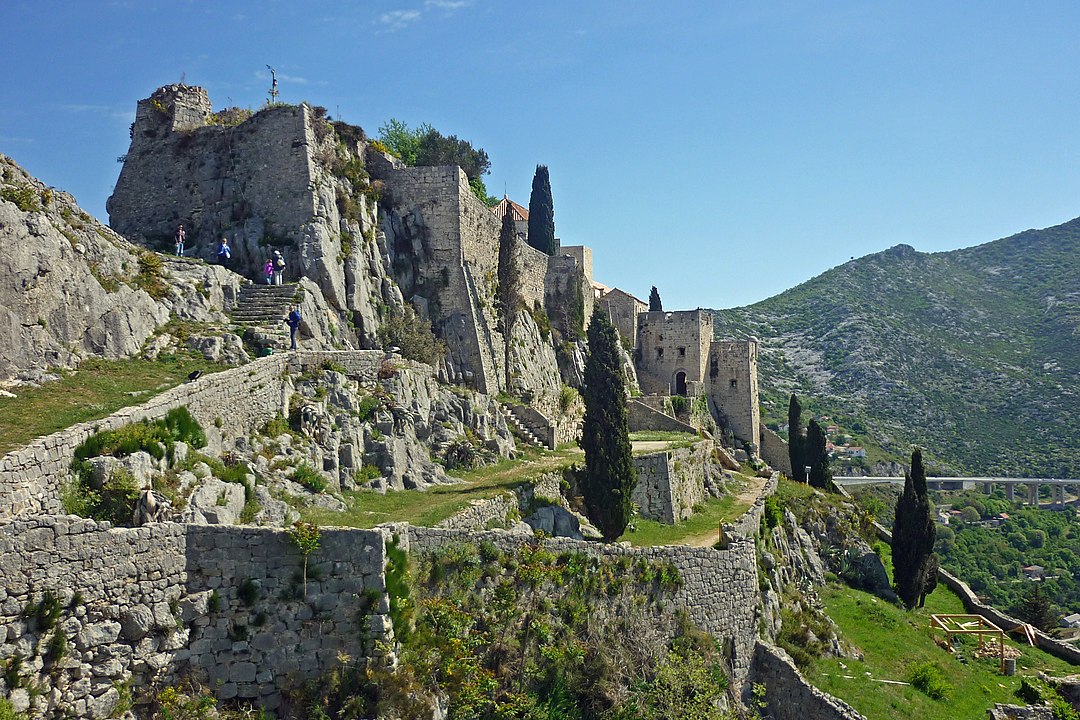 Kliss fortress
Kliss fortress
Marcotti offers a few pointers for towns and islands in the area:
At the mouth of the river Cetina, between Mount Biokovo and the sea is Omiš, a formidable ancient pirate nest. Ruins of the Mirabela and one other castle: excellent wines, pink muscat, even some dessert sparkling wines.
The man truly tells us what we want to know the most.
Šolta isn’t big: its chief town Grohote only has 1200 inhabitants. It’s been renowned for its honey since ancient times; the bees only suckle on rosemary.
Brač is the most important Dalmatian island, in terms of size, population and wealth. They produce vugava, an excellent prošek wine. (...) In the village Pučišće are quarries where stone was sourced for Diocletian’s grand construction in Split.
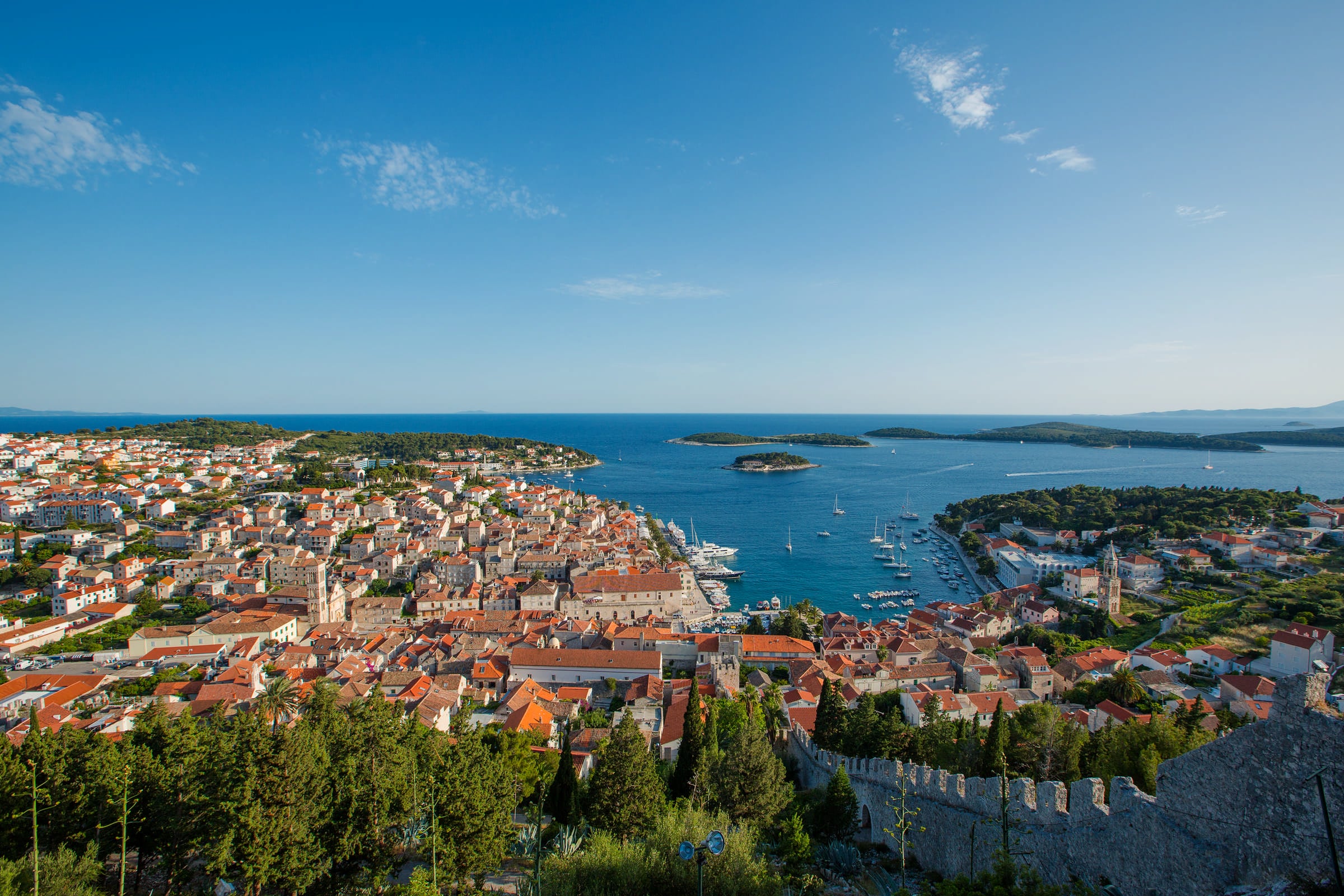 Hvar town by Mario Romulic
Hvar town by Mario Romulic
Hvar: shielded from bura wind by the island’s hills, and from sirocco wind by Pakleni islands, it enjoys a well-deserved reputation as a very favourable climate. Cypress, agave, carob and palm trees thrive there magnificently.
A particular thought stands out in this paragraph. At the time of his visit in the late 19th century, organised tourism was already in development in Croatia, notably in two destinations both mentioned here. Marcotti says:
If direct lines by sea between Italy and Dalmatia were properly established, Hvar town would be a highly recommendable winter destination for the Adriatic regions of the Kingdom, incomparably preferable to Opatija.
According to Spon, Hvar town was an inviting place even two hundred years earlier:
The people of the island, who are three or four thousand in number, have all withdrawn to the town of the same name so they can watch foreigners occasionally dock in their port. So they could receive them with more dignity, they have made there a beautiful pier of marble and stone blocks which lines the semi-circular port.
There is very good bread and very good wine, and plenty of sardines to whet the appetite, with which they also supply Italy and Greece.
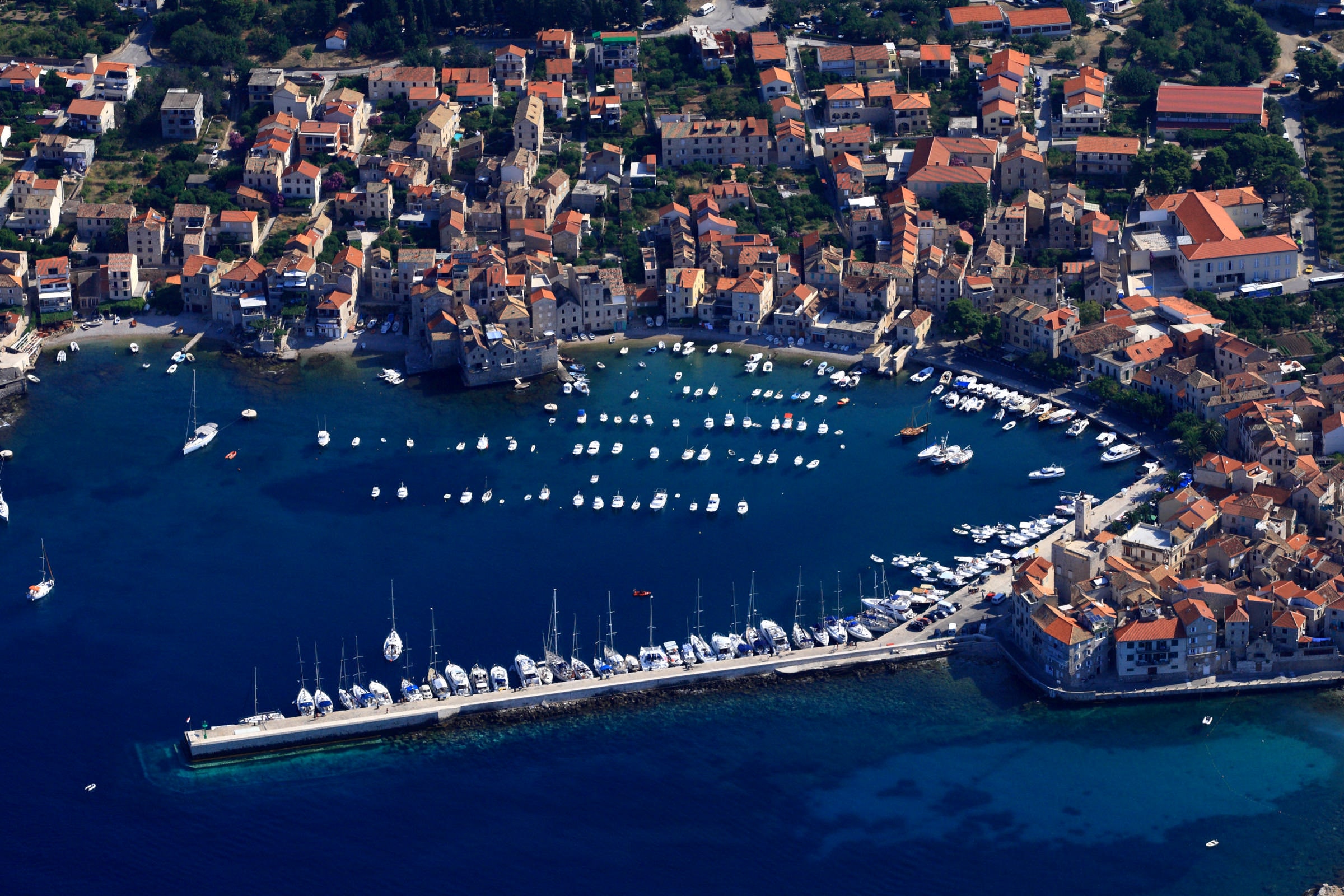 Komiža on Vis island by Mario Romulic
Komiža on Vis island by Mario Romulic
Vis: The island’s vegetation has a distinct southern character, with almond trees, figs, and palm trees. Some excellent wines are the opollo, the Margherita, the prosecco, the gripola, as well as vinegar and brandy. Sardines are abundant in Komiža; anchovies, mackerel, sea bream and snapper are found in all the waters around the island. The suckling lambs are delicious owing to the aromatic pastures of rosemary.
Spon also visited Vis island, but wasn't impressed with the sights:
I won't talk about the fortress, it's just a crow's nest that could be knocked down with ease from the nearby rocks. In the whole garrison there is but one simple soldier who performs the roles of Captain, Sargent and Porter, much like that of Plautus.
He goes to Korčula next, where he learns about jackals:
As this island is covered in woods, it is a haven for several wild beasts. Among them is a certain animal which I am told is built like a dog, but has the cry of a cat or a peacock. If one lights a fire at night near these woods, one can hear a great number of them shrieking and chanting their rabid song, such that those who have never heard them before mistake them for people yelling. It is also said that they dig up the dead to feed on them, and they are good for naught else, but to make some horrid furs out of them.
Next up: Dubrovnik, plus a few places we missed on our way south!
Sources for part II:
Jacob Spon, Voyage de l'Italie, de Dalmatie, de Grece, et du Levant, Fait és années 1675. & 1676., Tome I (Antoine Cellier le fils, Lyon, 1678)
Noé Bianchi, Viaggio da Venezia al S. sepolcro, et al monte Sinai (Remondini, Bassano, 1770)
Giuseppe Marcotti, L’Adriatico Orientale, da Venezia a Corfu (1899)
Alberto Fortis, Viaggio a Dalmazia, 1774 (Croatian edition: Put po Dalmaciji, Globus, Zagreb, 1984)
Comtesse de La Morinière de La Rochecantin, Croisière en Adriatique et en Méditerranée (1907)
Quotes translated from Croatian, Italian and French by the author of the article.
Environmental Awareness Event Held in Split
ZAGREB, 5 Feb 2022 - An event organised by the Economy and Sustainable Development Ministry to advocate a change of habits and encourage the reduction of humans' harmful impact on climate, nature and the environment, took place in Split's Prokurative Square on Saturday.
Local artisans - shoemakers, tailors, watchmakers, opticians, repairers of household appliances, locksmiths, knife grinders and others made minor repairs free of charge to objects brought by citizens.
The event, attended by Minister Tomislav Ćorić and Mayor Ivica Puljak, is part of the ministry's campaign #ZaZeleniSvakiDan, which has been going on since 2021 and which aims to show citizens that changing one's daily habits and reusing objects helps to preserve nature and have more available resources for future generations.
Ćorić and his associates also visited the city's open-air farmers' market, where they distributed to citizens bags made of recycled plastic and cloth bags.
The minister underlined that there was a growing awareness among citizens of the need to sort and recycle waste and avoid behaviour that causes environmental pollution.
Mayor Puljak said that the city administration would help local artisans with subsidies.
The head of the city association of artisans, Vilim Bujević, said that there were 4,500 craftspeople in Split, expressing hope the city authorities would support them.
For more, check out our lifestyle section.
Miletić: After Being Symbol of Progressive Policy, IDS is Taking Different Direction
ZAGREB, 5 Feb 2022 - The former leader of the Istria Democratic Party (IDS) and current Istria County prefect, Boris Miletić, issued a statement after his resignation from the party on Saturday, saying that the IDS had for years been "a symbol of progressive and liberal policies, a symbol of resistance to primitivism."
"We have built a progressive community in a country that does not have much to boast about. Unfortunately, the IDS is now taking a different direction, and obviously I have been recognised by the new leadership as the biggest obstacle to this political turnaround," Miletić said.
He said that no one had raised any of the reasons he was now being disciplined for at the party's extraordinary meeting last September when his report was adopted with one abstention.
"When I took political responsibility for the election results and when we were supposed to discuss it, no one said a word, like many times before that," Miletić said, noting that while he had served as IDS president all decisions had been adopted by the party presidency and not in an autocratic manner as claimed by the new leadership.
He said that today he had tendered his resignation from the IDS after four victories in local elections, three terms in the national parliament, after winning seats in the European Parliament in two elections and after nearly eight years at the helm of the IDS which throughout that time was the strongest Croatian regional party.
Miletić said that with his resignation, after 29 years and for the first time since counties were established "the IDS has lost Istria County." "The new IDS president now has a chance to show freely what he knows and what he can do."
Meanwhile, Pula mayor Filip Zoričić demanded an early election in Istria County, calling on the IDS and Miletić "not to hold Istria as their hostage".
He said that as the mayor of the largest city in Istria he wanted the regional government to be stable and functioning regardless of which political group had a majority.
For more, check out our politics section.
Minister: Those Fishing in Troubled Waters During Euro Changeover to be Exposed
ZAGREB, 5 Feb 2022 - Economy and Sustainable Development Minister Tomislav Ćorić said on Saturday that anyone trying to fish in troubled waters by unjustifiably increasing prices during the euro changeover would be exposed.
"There will be continual monitoring by the state, and, I'm confident, by consumer associations as well. Those who fish in troubled waters and possibly increase prices without justification must be exposed," the minister told reporters during a visit to Split.
Speaking of inflation, he said that global markets had unfortunately started raising gas, electricity and oil prices and that the state could not influence it more significantly except by cutting taxes to alleviate the impact as much as possible after electricity and gas prices go up on 1 April.
"As of 1 April we will do our best so that the electricity and gas price increase is as small as possible," he said.
The minister also noted that this year's inflation would be slightly higher than last year's rate of 2.8%.
Ćorić said that he believed that if the situation on the energy market calmed down, Croatia would not experience the impact of price hikes as experienced by some other EU members.
Asked if inflation would have an impact on this year's tourist season, Ćorić said that if commodity prices increased by a few percentage points in the first half of the year, a likely rise in energy prices could lead to a rise in prices of services.
"I think it will have an effect (on this year's booking prices) but I hope that it will be reasonable and that we will not fish in troubled waters because that makes us less competitive," the minister said.
Asked if the government would cap fuel prices, Ćorić said the government would respond if the prices escalated.


